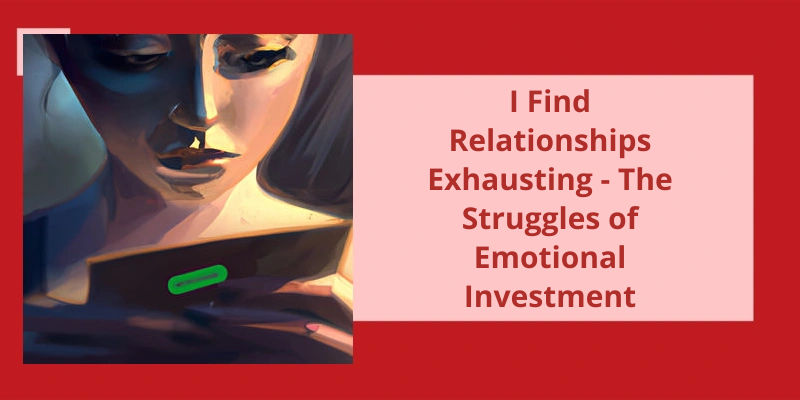As human beings, one of our basic needs is to connect and socialize with others. We crave companionship and desire to spend time with people we care about. However, sometimes the people we consider to be our closest friends may begin to drift away, leaving us feeling neglected and wondering what went wrong. A situation like this can be challenging to navigate, especially when we're not sure of the cause. It's natural to feel hurt, confused, and even angry, but it's essential to remain calm and communicate your feelings to your friend to find out what's going on. It could be that your friend is going through a tough time, such as a breakup or career change, or they may need some alone time to recenter themselves. By keeping an open mind and showing empathy, you can work through any issues and find a way to maintain your friendship.
How Do You Know When It’s Time to Let Go of a Friendship?
Friendships are an integral part of life. They bring us joy, fun, and companionship when we need it the most. However, sometimes these relationships can take a turn for the worse. As much as we may want to hold on to them, there comes a time when we must let them go. But how do you know when it’s time to let go of a friendship?
First and foremost, if you find that youre not a priority in your friends life, it may be time to re-evaluate the friendship. If they consistently cancel plans or don’t make an effort to connect with you, it’s a sign that they may not value your friendship as much as they should. It’s important to remember that friendships are a two-way street, and if one party consistently puts in more effort, it can create tension and resentment.
Another sign that it may be time to let go of a friendship is if you don’t connect at the same level. Friendships work best when both people want the same type of connection. If you find that you’ve different priorities, interests, and views on life, it can create a disconnect that may be hard to overcome. You may find that youre constantly compromising your needs for the friendship, which can be emotionally and mentally draining.
If you find yourself giving more than you take in the friendship, it’s a sign that you may need to re-evaluate whether the relationship is healthy for you. Friendships require effort from both parties, and if youre constantly the one reaching out, planning activities, and being emotionally supportive, it can lead to feelings of frustration and exhaustion. It’s okay to want a balanced relationship, where both parties give and take equally.
Lastly, if you find that your friends behaviour is consistently causing you stress, anxiety, or sadness, it may be time to let go of the friendship. As much as we may want to believe that our friendships are always positive and uplifting, the truth is that sometimes they can be toxic. If you find that your friends behaviour is negatively impacting your mental health, it may be time to prioritize your own well-being and let go of the friendship.
Remember, it’s okay to prioritize your own well-being and to let go of relationships that no longer serve you.
How to Have a Conversation With a Friend About the State of Your Friendship
- Choose a time to talk that works for both of you.
- Be honest about how you feel.
- Avoid blaming or attacking your friend.
- Listen to their perspective.
- Find ways to work together to strengthen your friendship.
- Remember that friendships take effort from both sides.
It can be tough when a friend seems too busy to spend time with you, but there are ways to work around their schedule without feeling neglected. Instead of getting upset or frustrated, try to think creatively and find ways to support your friend while still enjoying their company. By offering to join them in an activity that’s already on their schedule, you can show your support and make the most of the time you do have together.
How Do You Deal With a Friend Who Doesn’t Make Time for You?
Another approach is to communicate openly with your friend about how their behavior is making you feel. Be honest about your emotions and explain that while you understand theyre busy, it hurts when they constantly cancel plans or don’t make time for you. This approach may require vulnerability and a willingness to address potential conflicts, but it can ultimately lead to a stronger friendship.
It’s also important to recognize that your friends busyness may not be a personal reflection on you. They may have other obligations and responsibilities that take priority in their life. Showing empathy and understanding can go a long way in maintaining a healthy friendship.
If your friend consistently fails to make time for you and doesn’t respond positively to your efforts to work around their schedule or communicate openly, it may be necessary to reevaluate the friendship. While letting go of a friendship can be difficult, it’s important to prioritize your own well-being and surround yourself with people who value your time and presence.
Source: Should We Make Time For People Who Don’t Make Time For …
Knowing when to end a friendship isn’t an easy decision. However, sometimes it becomes necessary to do so for our own well-being. If a friend doesn’t respect our feelings, causes us anxiety or holds back information, it could be signs of an unhealthy relationship. According to Schmitt, trust is a significant factor in building deep connections, and if that trust is lost, it may be time to say goodbye to the friendship.
How Do You Know When It’s Time to Leave a Friendship?
Friendship is a beautiful bond that often lasts for years, but sometimes, relationships turn sour, and you may find yourself wondering whether it’s time to end a friendship. A major red flag that indicates it’s time to leave a friendship is when your friend doesn’t respect your feelings. If they regularly belittle or dismiss your emotions, it’s a sign that they don’t value you as a friend. In such a case, it’s time to move on and find someone who appreciates you and your feelings.
Another tell-tale sign that your friendship is unhealthy is when you feel anxious or negative in your friends presence. If your stomach tightens or you feel uneasy when youre around them, it’s a clear signal that the bond is no longer positive. A good friend should enrich your life and bring joy, not negativity or anxiety.
Trust is the bedrock of any meaningful friendship, and if your friend is dishonest or holds back important information, it’s a sign that the relationship isn’t built on trust. You may never know what else theyre hiding, and this can breed resentment and suspicion over time. As Kathleen Vohs, a professor at the Carlson School of Management at the University of Minnesota, writes in Psychology Today, “Friendships are based on honesty and mutual concern, and when one person isn’t pulling their weight, your world feels off-kilter.”
It’s also time to end a friendship if the other person is constantly trying to change you, belittle you or mold you into someone youre not. A good friend should love and accept you for who you are, not try to change you into their ideal. You should never feel like youre walking on eggshells around them, or like you cant be your authentic self.
Finally, if youve tried to communicate with your friend and they still don’t seem to understand or respect your feelings, it’s probably time to move on. Remember that a strong and healthy relationship should be built on mutual respect and understanding. If your friend can’t provide this for you, don’t be afraid to move on and find someone who can. Life is short, and it’s important to surround yourself with people who lift you up and make your days brighter.
How to Communicate Effectively With a Friend Who Is Causing Problems
When communicating with a friend who’s causing problems, it’s best to approach the conversation with empathy and understanding. Start by listening to their perspective without judgment, and then express your concerns in a calm and respectful manner. Use “I” statements instead of “you” statements to avoid sounding accusatory. Offer solutions and compromises together, and try to find common ground. It’s important to maintain open and honest communication, but also set healthy boundaries if necessary.
Spending time with friends is an important aspect of life that contributes to our emotional well-being. However, as we grow older and take on more responsibilities, finding time to catch up with friends becomes increasingly challenging. A recent survey shed light on average time adults spend with their friends and their attitudes towards keeping in touch.
What Is the Average Time to Spend With Friends?
Socializing with friends is an important aspect of life that contributes to our overall happiness and well-being. However, with the demands of work, family, and other obligations, it can be difficult to find the time to connect with friends on a regular basis. According to recent studies, the average adult spends approximately four hours a week socializing with friends. This may seem like a relatively small amount of time, but it can still have a significant impact on our happiness and sense of connectedness.
Some people may spend more or less time with friends depending on their individual circumstances. For example, those who work long hours or have demanding family responsibilities may find it harder to make time for socializing with friends.
Despite the challenges of finding time to socialize with friends, research indicates that it’s important to make this a priority. Additionally, maintaining close friendships can provide a valuable support system during times of difficulty or upheaval.
Interestingly, many people feel that it’s strange to go a whole day without speaking to their best friends. In fact, almost half of adults report feeling this way. This highlights the importance of regular communication and connection with friends, even if it’s just a quick text or phone call. Maintaining these connections can help foster a sense of community and belonging, which is essential for overall well-being.
Whether it’s setting aside a few hours each week to see friends in person, scheduling regular phone or video chats, or simply sending a quick message to check in, maintaining these connections can have a significant impact on our happiness and well-being. By making time for friends, we can cultivate a sense of community and connection that enriches our lives in countless ways.
Tips for Introverts on How to Maintain Friendships Without Feeling Overwhelmed
- Find common interests that you can bond over with your friends.
- Schedule low-key hangouts, like watching a movie or going for a walk.
- Communicate your needs and boundaries to your friends, and don’t be afraid to take breaks when necessary.
- Set small, achievable goals for socializing and gradually work your way up to bigger events.
- Remember that it’s okay to say no to invitations if you’re feeling overwhelmed or need some alone time.
- Make use of technology to stay connected with friends, like texting, social media, or video chats.
- Try new activities or hobbies that involve socializing, like joining a club or taking a class.
Building a genuine social bond takes effort and time. Recent research indicates that we need to spend about 34 hours in one another’s company to establish a strong foundation for friendship. However, quantifying the exact amount of time spent with someone isn’t the only element that cultivates an enduring friendship. There are also other contributing factors to consider, such as shared experiences and trust.
How Many Hours Is a Friendship?
The study also found that the bonding experience between friends isn’t just about the quantity of time spent together, but the quality as well. Shared experiences, emotional connection and a sense of trust all play a crucial role in forming strong friendships. Whether it’s sharing a hobby or interest, confiding in each other about personal struggles, or simply spending time in each others company, these factors help to create a sense of familiarity and closeness that’s essential to the development of a meaningful friendship.
However, it’s important to note that the amount of time it takes to form a friendship can vary depending on a number of factors. Some people may be more open and outgoing, making it easier for them to connect with others quickly. Others may be more reserved, taking longer to open up and establish trust. The context of the social interaction can also be a factor, with friendships formed in a work or school setting often taking longer than those forged through shared interests or hobbies.
Despite these variables, the research suggests that the 34-hour rule is a good benchmark for anyone looking to establish new friendships. By dedicating a certain amount of time and energy to socializing with others, whether through group activities, one-on-one conversations or casual get-togethers, we can increase our chances of forming meaningful connections and expanding our social circles.
The Importance of Communication in Friendship-Building
Communication plays an essential role in developing and strengthening friendships. Clear and effective communication helps build trust, understanding, and empathy between friends. Without communication, misunderstandings and conflicts may arise, leading to the deterioration of the friendship. Therefore, it’s crucial to prioritize healthy communication in friendship-building.
Conclusion
In conclusion, it can be challenging when a friend starts to spend less time with us. However, it's vital to remember that everyone's lives have different demands, and it's not necessarily a reflection of their feelings towards us. It's essential to communicate our concerns with our friend openly and honestly, without placing blame or making assumptions. It's also important to respect their boundaries and prioritize our own self-care. Ultimately, friendships, like any relationship, require effort and understanding from both parties, and sometimes they require a little extra patience and flexibility during certain seasons of life.






